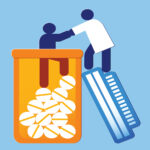A drug is a chemical substance that acts on the brain and nervous system, changing a person’s mood, emotion or state of consciousness. Drugs are often classified by the effect they have.
Stimulants, such as cocaine, make people feel full of energy. Depressants (or sedatives), such as heroin, make people feel relaxed. Hallucinogens, such as LSD, make people see, feel or hear things that are not real. Drug or substance misuse is when a person regularly takes one or more drugs to change their mood, emotion or state of consciousness.
Substance use is higher and more excessive in transgender people: evidence, limitations and gaps

Ivan Ezquerra-Romano summarises a systematic review looking into the prevalence of substance use among transgender people compared to their cisgender counterparts.
Today we also announce the launch of a new survey that will help us understand alcohol use in UK transgender and non-binary people.
[read the full story...]








